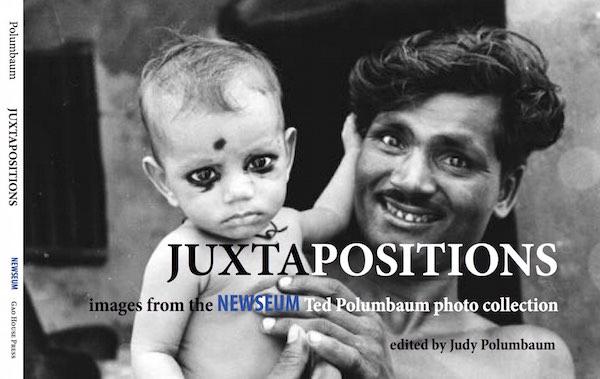By Claire Dietz
Judy Polumbaum grew up in the dark room.
She still remembers the first camera her father, Ted — a photojournalist who captured such personalities as Ted Kennedy and Julia Child for a number of high-profile magazines — bought her: a Brownie.
Polumbaum — a professor emerita in the University of Iowa School of Journalism and Mass Communication — is preparing for the launch of her newest book, Juxtapositions: Images from the Newseum Ted Polumbaum Photo Collection, at 7 p.m. today at Prairie Lights, 15 S. Dubuque St.
The book, which pairs her father’s photographs with unlikely matches, is a way for Polumbaum to make sense of the 200,00-plus photos in her father’s archive and bring them to a wider audience.
In discussing her father’s origins in the business, Polumbaum said he became a photographer “on accident” — or out of necessity — after being blacklisted during the Red Scare.
“Those who were called to testify, who resisted the committee, were blacklisted, out of work for the rest of their lives,” Polumbaum said. “It ruined families, it led to suicides, and a lot of tragic stories. But — these people who resisted naming names — then they were ostracized, now they are heroes. In his very understated, unintended way, my dad was a political hero.”
During a career working for Time and Life as a freelance photojournalist, Ted Polumbaum often traveled to places such as Chile and China for assignments.
Throughout his career, Polumbaum said, her father’s primary interests remained in finding the extraordinary in the everyday.
“His true interest was ordinary people,” she said. “He had tremendous social consciousness, and he believed in humanity and the dignity of ordinary people. He believed in individualizing people.”
Ted Polumbaum and his camera were also present at a number of important junctures in recent American history, including presidential campaigns and the Summer of Freedom during the height of the Civil Rights Movement in the South.
Some of his better-known portraits were of Jackie Kennedy while on the campaign trail with her husband, President John F. Kennedy, and of Julia Child at home in her kitchen.
Further, what many assume to be the last photo of the three Mississippi civil-rights workers’ whose abduction and subsequent murder sparked the revolutionary Freedom Summer has also been attributed to Ted Polumbaum.
After his death in 2001, Polumbaum and her family were left with a massive archive of photos and seemingly nowhere to put them. Now, her father’s entire collection is stored in the Newseum in Washington, D.C.
While Polumbaum said she was glad the collection was in such “good hands,” she worried about whether the most powerful images were reaching as many people as they could. Polumbaum intends for Juxtaposition to function as her way of trying to reach a much larger audience.
“It’s a selection of what I think of as some of his most powerful work,” she said. “Every spread has a pattern; it’s designed to make people think. [The photographs] have to belong to a pair, and I had to choose what was the best of those pairs. Behind every individual picture is another long story.”
Polumbaum wanted to bring to the page some of her father’s best works, but she also wanted to capture who he was in the process.
“He didn’t want to create sort of iconic, universal images; he wanted to reflect the experiences of individual, actual people,” she said. “That gave his pictures a kind of straightforward sensibility, but I think it makes them beautiful because he was interested in people; he believed in people and had hope for the world.”
For Polumbaum, she said she knows “the most important thing is to share the caliber of [her father’s] work.”
“He was a person of great integrity,” she said. “The basic reason for doing this book is to get fantastic work out there, but the next reason is because the photographer was a wonderful human being, [about] which my dad would say, ‘That’s totally irrelevant.’ He was my greatest fan; it was a huge loss to me to not have him around.”



